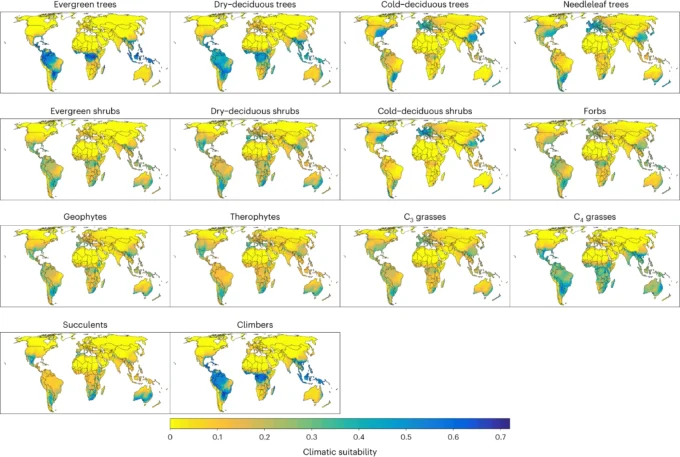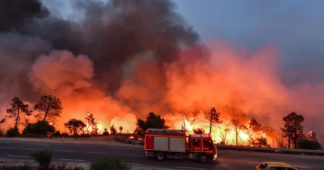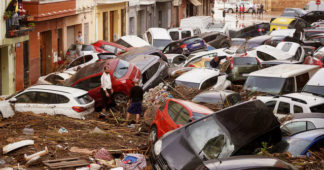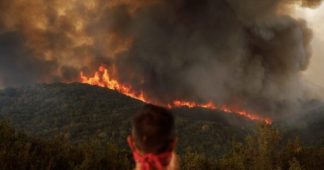By Dec 20, 2024
2024 will be the warmest year on record, the year warming topped 1.5 degrees Celsius. It’s the year the US set new oil and gas production records, surpassing Saudi Arabia and Russia. It’s a year that saw the US re-elect a climate denier who vows to double US oil production over these record levels, assuming that’s even possible.
It’s a year that saw two of the most destructive hurricanes in US history roar back across the Gulf Coast. It’s the year a tropical cyclone demolished the French colony of Mayotte, killing as many as 10,000 people. In 2024, the temperature in Death Valley hit 130.1; Tepache, Mexico, 125.6; Aswan, Egypt, 121; Las Vegas, 120; and Redding, California, 118. Van Buren, Missouri topped 90 in February. It was the year arid regions like Valencia, Spain, the UAE, Morocco and Algeria, Roswell, New Mexico, and Moab, Utah experienced devastating floods. Storm Boris unleashed a month’s worth of rain in 24 hours on much of Europe. Meanwhile, much of the mid-Atlantic region in the US went more than a month without rain this fall.
It’s the year the UN climate conference, held in the oil city of Baku, failed to reach an agreement on phasing out fossil fuels and committed to providing less than a third of the annual climate funding needed for developing nations to transition from fossil fuels. It’s the year when CO2 levels hit 425.01 PPM, nearly 3 PPM more than last year’s record high. It’s the year when wildfires in Canada burned all year long.
January
+ CO2 reading for Jan. 1, 2024: 422.23 ppm
+ It’s now official: 2023 was the warmest year on record at 1.43C above preindustrial levels, beating the prior record set in 2016 by 0.14C. This continues a rapid warming trend that’s seen global temperatures rise around 1C since 1970.
+ December 2023 was the warmest December on record for the Contiguous U.S. by a wide margin. It was 0.67°F (0.37°C) warmer than December 2021.
+ A new study in Nature estimates that even under an optimistic scenario “the global North would overshoot its share of the 1.5 °C carbon budget by a factor of three, appropriating half of the global South’s share in the process.”
+ The Great Lakes typically have an ice coverage of 55% during the winter months, causing at least half of their surfaces to freeze. As of January 1, they had a combined ice cover of just 0.2%. Lake Superior 0.5%, Lake Michigan 0%, Lake Huron 0%, Lake Erie 0%, Lake Ontario 0%…
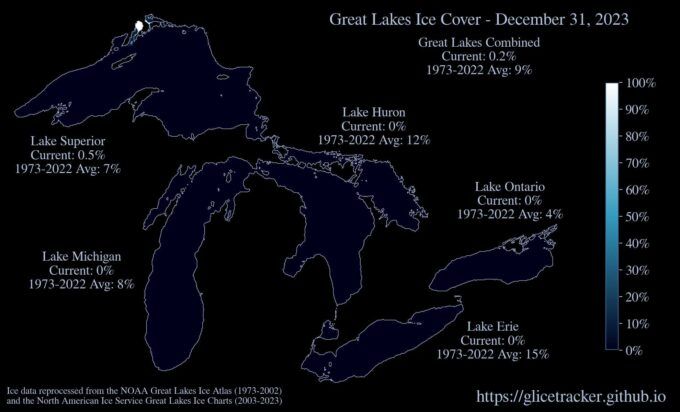
+ James Hansen: “When our children and grandchildren look back at the history of human-made climate change, this year and next will be seen as the turning point at which the futility of governments in dealing with climate change was finally exposed.”
+ After an 8-year battle, Judge Ann Aiken has dismissed all of the US government’s motions to dismiss and further stall the so-called youth climate constitutional case Juliana v. US. The case is now bound for trial. In her 49-page opinion, Judge Aiken wrote: “This catastrophe is the great emergency of our time and compels urgent action. As this lawsuit demonstrates, young people—too young to vote and effect change through the political process—are exercising the institutional procedure available to plead with their government to change course.”
+ Leaders at COP28 agreed to a “historic” $700 million in loss and damage funding. Meanwhile, BP, Shell, Chevron, ExxonMobil and TotalEnergies are about to reward their investors with record payouts of more than $100 billion.
+ In the last twenty years, southern New England has experienced nearly 30 fewer snow days a year.
+ The snowpack at the base of our local strato-volcano, Mt. Hood, sits nearly 50 inches below the normal amount for this time of year.
+++
+ You scour the headlines for little rays of hope and, instead, just keep finding shit like the bracing results from this recent AP survey on American attitudes about climate change: “Americans are less convinced that climate change is caused mostly or entirely by humans compared to data from recent years, declining from 60% in 2018 to 49% this year…This increased doubt was just as significant for someone who graduated from college as someone who has a high school diploma or less (11 percentage point drop) and was more pronounced for younger Americans (17 percentage point drop for those ages 18-29 vs. 9 percentage point drop for the 60+ age group)…Democrats and independents are becoming less convinced that climate change is caused mostly by humans, while Republican attitudes remain stable.”
+ According to Berkeley Earth’s 2023 Global Temperature Report 2023 was by far the hottest year since direct observations began: 2023 was 1.54 ± 0.06 °C (2.77 ± 0.11 °F) above the 1850-1900 average, the first year above 1.5 °C (2.7 °F).
+ The melting of Greenland’s ice sheet is accelerating rapidly. A new study published in Nature estimates that Greenland is losing an average of 30m tonnes of ice an hour–20% more than was previously thought. The torrents of freshwater flushing into the Atlantic are expected to speed the collapse of the ocean currents called the Atlantic meridional overturning circulation (Amoc), the consequences of which will be dire.
+ There’s been a big leak in a pipeline on Alaska’s North Slope, very close to the boundary of the Arctic National Wildlife Refuge. The leak started on Saturday evening and the preliminary estimate is 11,550 gallons (275 barrels) of natural gas condensate, also known as “light oil.”
+ Modi’s climate two-step…
Dec 11: India announces plan to double coal production by 2030
Dec 13: India signs off on “transitioning away from fossil fuels at COP28
Dec 22: India lays out plans to build 88 GW of coal power plants
+ A piece in the Financial Times predicts that the countries in the global south expected to experience the most extreme climate disasters “face a massive financing gap: they need $4.3 trillion by 2030 to avoid the worst impacts of climate change.”
+ Thousands of U.S. homes have flooded over and over again: “The bottom line is that the risk and the damages are increasing faster than we are dealing with them.”
+ Recently reclassified as a ‘humid subtropical’ climate, New York City, experienced nearly 700 consecutive days with less than an inch of snowfall.
+++
+ Let’s check the scoreboard for how the Climate Prez is doing: the United States is now producing more oil than any country in history: 13 million barrels per day (International Energy Agency). The US now produces one-in-five barrels of global oil production.
+ Since 1970, the Greenland ice sheet has lost over 6 trillion metric tons of ice, which is more than 700 tonnes lost per person for every person on the planet today.
+ A new report says that climate change, not El Niño, was the main driver of the Amazon drought in 2023. The study concluded that climate change made the agricultural Amazon drought 30 times more likely from June to November. In Amazonas state, 59 out of 62 municipalities are facing drought and 15 of them are in an emergency situation, according to the Amazon Working Group. Rivers in some regions have fallen to their lowest levels in more than 120 years. The drought has increased the spread of wildfire and caused mass die-offs of fish and dolphins.
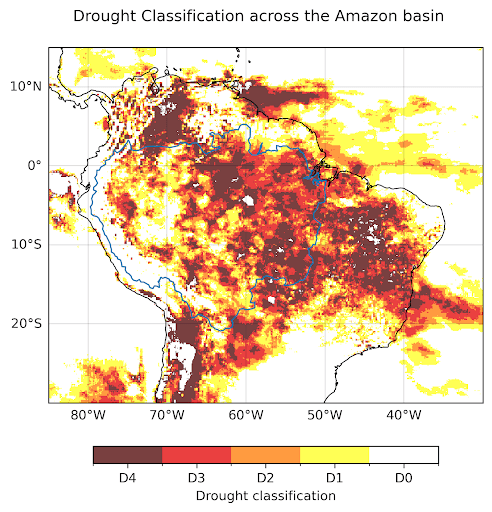
+ Because climate change isn’t producing the expected increase in atmospheric moisture over dry regions, according to a study from the National Science Foundation: “We could be facing higher risks than what’s been projected for arid regions like the SW, which has already been affected by water shortages and extreme wildfire…”
+ In most parts of the country, charging an EV is equivalent to a gasoline price of $1 to $2 per gallon. The national average is $1.41 per eGallon, which is less than half the current gasoline price of $3.07 (as of Jan. 16, 2024)
+ On one of the coldest days of the year in Texas, solar output hit a record high of more than 14,000 megawatts of production, contributing about 20% of the total production of the ERCOT power grid.
+ Officials in southern Portugal’s Algarve region are planning to cut the water allocation for agricultural use by 70% and for households by 15% this year. But the region’s reservoirs are still likely to run dry by summer. An official said, “The situation is becoming catastrophic.”
+ In the last three years, renewable energy cut over $1 trillion from the fuel bill of the electricity sector worldwide.
+ The EU announced it will ban diesel trucks by 2040. Medium and heavy-duty trucks constitute about 3% of the vehicles on the road but they account for 30% of the pollution.
+ A new analysis projects that ammonia-fueled ships can prove cheaper to run than a fossil-fueled fleet and cut emissions by nearly 80%.
+ Just one of the 23 planned LNG facilities could lead to as much greenhouse gas being emitted over the course of its expected operating life, as the EPA’s new methane rule is projected to save in total over the next 15 years.
February 2024
+ During the deluge that submerged much of California this week, a weather station on the UCLA campus recorded nearly 12 inches of rain in 24 hours, a one-in-1000-year rainfall event for Westwood. (Probably happen five more times in the next ten years.)
+ January 2024 was the warmest January on record according to the recently released ERA5 reanalysis. This is the 8th consecutive monthly record.
+ Global sea surface temperatures hit another record high on Tuesday, reaching 21.13°C for the first time in recorded history.
+ Of the world’s three largest tropical rainforest regions, the Amazon, Southeast Asia, and the Congo, only Congo has enough standing forest to remain a strong net carbon sink.
+ Describing the current classification system as inadequate, a new study published in the journal Proceedings of the National Academy of Sciences calls for adding a Category 6 to the hurricane scale, as climate change intensifies the destructive power of hurricanes.
+ More than 110 people were killed in wildfires on the urban/rural interface near Valparaiso, Chile. Hundreds are still missing, making these the deadliest wildfires in South American history. Many of the fires burned in monocultural plantations.
+ In the past 10 years, 183 counties in the US saw their first wind project come online. However, according to an analysis by USA Today, over the same period, nearly 375 counties passed measures blocking new wind developments.
+ The Energy Information Agency (EIA) estimates that large-scale cryptocurrency operations are now consuming more than 2 percent of the US’s electricity.”
+++
+ It’s February and Alberta just declared an early opening to “fire season.” There are a total of 54 new fires and dozens remaining from last year that continue to burn.
+ Still Unsafe at Any Speed: According to a study of the harm done by cars published in Science Direct, one in 36 deaths (1.36 million deaths a year) has been linked to “automobility.” Globally, cars and automobility have killed 60–80 million people and injured at least 2 billion.
+ Can’t wait to see how the Sierra Club and the rest of GangGreen rationalize Biden’s latest retreat on his environmental pledges. This time he’s instructed EPA to back off its strict new tailpipe emission standards, in order to slow the transition to Electric Vehicles, where US automakers continue to lag far behind both China and Europe…
+ The Ninth Circuit Court of Appeals, once the most progressive court in the country, just struck down a moratorium on the export of coal mined from federal lands. The Associated Press described the ruling as “a setback for Dems and environmentalists.” Not to mention a rapidly warming planet. Northern Cheyenne Tribal Administrator William Walksalong: “We need the Biden administration to step up & live up to its promises to protect our climate, conduct a long overdue review of the federal coal leasing program and make thoughtful plans for the future of public lands.”
+ Biden’s Bureau of Land Management is reviewing a sprawling carbon storage project proposed by ExxonMobil for federal lands in eastern Montana. Apparently, even if we succeed in transitioning from oil, we’ll never rid ourselves of the oil companies…
+ A study published last week in the journal Science Advances is the first to show a strong link between large-scale locust swarms and climate change: ‘Heavy wind & rain may be triggering widespread, synchronized desert locust outbreaks in key breadbasket regions of the world, new research shows. And the range of these ravenous, crop-stripping locusts could expand up to 25% due to climate change.’
+ Of the nearly 1,200 migratory species monitored by the U.N. – including whales, sea turtles, apes, songbirds and others – more than one-fifth are now threatened with extinction.
+ In Okinawa, the water levels of its reservoirs are so low they’ve been forced to switch to using water from Chubu, which has been deemed unsafe for drinking water because of high levels of PFAS contamination.

+ January 2024 was the eighth consecutive month where monthly global temperatures hit a record high. It was also the planet’s second-wettest January on record, according to NOAA.
+ Don’t blame El Nino. Historically, the temperatures of El Nino winters are about the same as La Nina winters.
+ The development of 10 Amazon data centers in two rural counties (Morrow and Umatilla) has turned one of Oregon’s smallest utilities (Umatilla Electric Cooperative) into one of the state’s biggest polluters. Umatilla Electric, which has only 16,000 customers, now generates 1,812,263 metric tons of CO2 a year. Compare that to the Eugene Water & Electric Board (EWEB) which serves 97,060 customers and generates only 82,570 metric tons of CO2 a year.
March
+ Given the record temperature in the Atlantic basin, hurricane season may start early and end late this year…
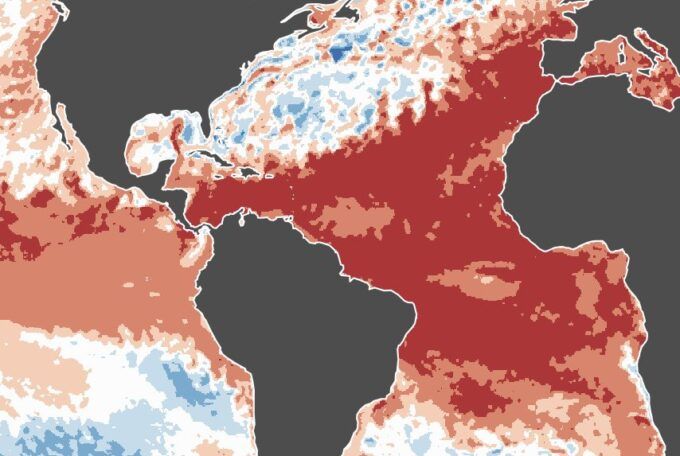
+ Fifteen years before it was predicted, the average global temperature has breached 1.5C above pre-industrial levels over a 12-month period.
+ Oil and gas profits have tripled under Biden, but still the industry wants to evict him in favor of Trump. It’s a lesson Biden still hasn’t learned after five decades in politics.
+ For the third year in a row Atlantic sea ice reached a new low, signaling that the continent’s sea ice has undergone an ‘abrupt critical transition.’”
+ The Smokehouse Creek fire in West Texas began a week ago Monday, spread more than 80 miles in the space of a few hours and at some points was growing as much as 150 football fields every minute. By Thursday, it had become the second-largest burn in modern American history and is now larger than any California wildfire on record.
“According to the National Interagency Fire Center, Minnesota & Wisconsin will see an above-normal wildfire risk starting as soon as March.”
+ By March 1st, 2024, the fire season had already burned 1.5 million acres–more than 50% of all acres burned last year nationally.
+ With global temperatures rising to unprecedented levels, fossil fuel subsidies surged to a record $7 trillion in 2022.
+ After years of funding climate denial, Exxon’s CEO Darren Woods told Fortune magazine this week that the public was to blame for climate change, not the fossil fuel industry: “The dirty secret nobody talks about is how much all this is going to cost and who’s willing to pay for it. The people who are generating those emissions need to be aware of and pay the price for generating those emissions. That is ultimately how you solve the problem.”
+ With at least 150 so-called zombie fires from last year still burning under snow-covered ground, Canada is bracing for another “This year’s fire season may be worse than the record-breaking season of 2023, when 1000s of fires burned 48 million acres million acres. ‘There’s no historical analog to what we’re seeing right now,” said Mike Flannigan, a professor of wildfire science at Thompson Rivers University in Kamloops, British Columbia. “Most years they’re not a big deal. But now a lot of these fires have the potential that when the snow melts and it gets warm, dry and windy to actually grow again. So it is a serious issue.”
+ It snowed here in the Willamette Valley on the opening days of meteorological spring, but as for winter…28% of the lower 48 states experienced temperatures at least 5 degrees above normal for the entire season.
+ A new study published in the journal Nature Reviews Earth and Environment projects that under all future emissions scenarios, the Arctic Ocean will likely become ice-free for the first time on a late August or early September day within the next 10 to 15 years.
+ The North Atlantic sea surface temperature has been at record warm levels for an entire year now, setting daily record highs every day for 365 consecutive days and counting.
+ Following France, Spain is banning some short-haul domestic flights, and possibly private jets as well, as part of its plan to reduce carbon emissions. The restrictions would apply to most flights with a rail alternative that take less than two and a half hours.
+ New study in Nature: “Almost the entire vegetated land surface [of the planet] will be subject to substantial changes in how climate supports the plants that define terrestrial ecosystems…A profound transformation of the biosphere is underway.”
+++
+ The world’s five biggest fossil fuel companies (Total, Chevron, Shell, BP and Exxon/Mobil) are expected to add 51 billion tonnes of C02 emissions to the atmosphere between now and 2050. A new study by Global Witness finds that the planned fossil fuel production from these “5 majors” will kill 11.5 million people by 2100.
+ The annual atmospheric increase in CO2 was a staggering 3.4 parts per million (ppm) in 2023.
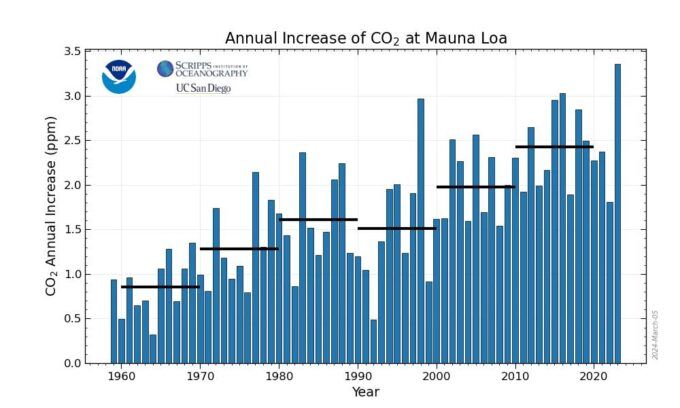
+ A million tons: the amount of ice Greenland loses every two minutes.
+ Every day for the last 12 months, global sea surface temperatures have broken records.
+ Phoenix, the US’s hottest city, experienced a record 645 deaths related to high temperatures in 2023–50% higher than the number of heat-related deaths in 2022.
+ In 1993, the US Forest Service fought wildfires on 1.79 million acres. By 2021, the number of burned acres had more than quadrupled.
+ This week State Farm announced plans to not renew around 72,000 property and commercial apartment policies in California starting this summer, largely because of the increased risk of climate-driven wildfires. State Farm is California’s largest property insurer.
+ According to a report from the Royal Society, Giant Sequoias are now much more numerous and in better condition in the UK than they are across their native range in the Sierra Nevada Mountains of California.
+ Desert ecosystems are much more sensitive to climate changes than previously believed. Research in the Sonoran desert has found a sharp decline in vegetation cover, especially in drier areas, mostly attributed to rising temperatures and less rain.
+ China, the world’s leading solar supplier, doubled production capacity last year and now produces nearly three times more panels than global demand. Global prices for panels have fallen 50% in the past year to as low as 10 cents a watt.
+ China’s global share of EV sales hit 48.2% last week and will pass 50% within 3 months predicted Wang Chuanfu, CEO of China’s leading EV-maker BYD.
+ In 2019, 149 million people worldwide were classified as ‘acutely food insecure’ – meaning they did not have enough food to meet their daily nutritional needs. Only four years later, that number has more than doubled to 333 million. One leading cause has been droughts and crop failures attributed to climate change.
+ In the first two-and-a-half months of 2024, more than 10,000 wildfires have burned across 11,000 square kilometers of the Amazon, according to real-time satellite monitoring, a record number for this early in the year.
+ In 2023, carbon emissions in the UK fell to their lowest level since 1897.
+ Lula has made lofty pledges to address climate change and protect the environment, goals that will prove very challenging to meet if Petrobras, Brazil’s state-run oil company, goes forward with its plans to significantly boost oil production, with the goal of becoming the world’s third-largest oil producer by 2030.
+ The scheduled delays in retiring South Africa’s remaining coal plants could cause 32,000 excess deaths from air pollution, according to a report by the Centre for Research on Energy and Clean Air (Crea).
+ According to a study out of MIT: “The Cloud now has a greater carbon footprint than the airline industry. A single data center can consume the equivalent electricity of 50,000 homes. At 200 TWh annually, data centers collectively devour more energy than some nation-states.”
+ The Biden Administration isn’t just permitting the destruction of Thacker Pass, it’s subsidizing the massive lithium mine slated for the Oregon/Nevada border to the tune of $2.26 billion…
+++
+ In 2020, one in 25 cars sold worldwide was electric; by 2023, it was one in five.
+ UN emissions data is so out of date and incomplete that no one really knows how close most countries are to meeting their emissions targets.
+ People who live in France now produce 7% less carbon than the average person on Earth.
+ A study in Nature reports that fire suppression may be a more important factor in driving the intensity of wildfires than fuel accumulation.
+ This week ocean temperatures in the tropical Atlantic reached levels not normally found until June 3.
+ Hundreds of gray whales have starved to death off the Pacific Coast, owing to a sharp decline in food availability in their Arctic and sub-Arctic feeding grounds attributable to warming oceans…
+ Several of the largest new oil and gas field discoveries since 2021 have been made by companies with net-zero emissions pledges.
+ Agriculture accounts for 74% of the water diverted from the Colorado River, roughly three times as much as the amount of water consumed by cities. Nearly half (46%) of the Colorado River’s water is used to grow alfalfa and other hay crops for cattle.
April
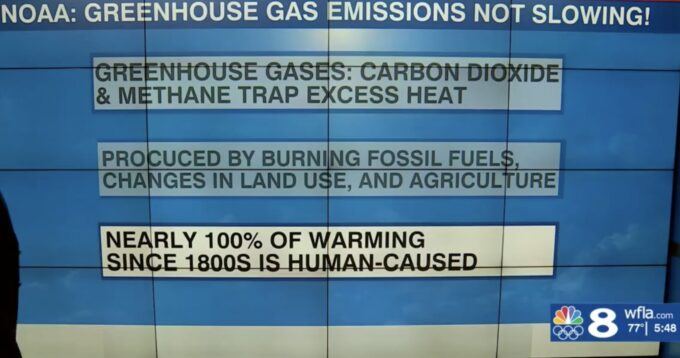
+ Nine of the 10 hottest years have been recorded in the past 10 years and all 10 since 2005.
+ Under Biden, the Climate prez, US LNG exports are at record highs (almost 16 billion cubic feet per day) and are projected to keep on growing. In 2016, LNG exports from the US were nearly zero.
+ UN climate chief, Simon Stiell: ’It’s blazingly obvious that finance is the make-or-break factor in the world’s climate fight.’”
+ A new “rapid analysis” study shows that the “dangerous humid heat” that oppressed western Africa in mid-February was made 10 times more likely by human-caused climate change.
+ Summer temperatures across much of Western Europe have risen three times faster than the global mean warming since 1980.
+ Around 77% of Texas’ electricity is now powered by solar, wind and nuclear.
+ A recent study by Australia National University predicts that Australia is facing 20-year-long megadroughts.
+ Marine protection areas in the Caribbean haven’t helped to revive failing fish populations.
+ Most nuclear plants in the US are unprepared for climate-driven disasters, such as wildfires and floods, according to the Nuclear Regulatory Commission. Nearly 60% of the country’s nuclear power capacity is directly threatened.
+ The Economist: “About a tenth of the world’s residential property by value is under threat from global warming—including many houses that are nowhere near the coast.”
+ Around 54% of ocean waters containing coral reefs have experienced heat stress high enough to cause bleaching, according to the National Oceanic and Atmospheric Administration’s Coral Reef Watch. The bleaching is increasing at a rate of 1 percent a week.
+ On April 6th, the low temperature in Biarritz was +72.5°F, which was the highest minimum temperature ever recorded in France for the month of April. In fact, +72.5°F was one of the highest minimum temperatures ever measured in Biarritz (for any month).
+ The European Court of Human Rights last week ruled that the Swiss government had violated the human rights of 2,000 women over the age of 64, known as KlimaSeniorinnen, or Senior Women for Climate Protection, their government’s failure to combat climate change put them at a higher risk of dying in heatwaves. The women argued they could not leave their homes and suffered ill-health during frequent record hot spells. The landmark ruling forces Switzerland to take aggressive steps to reduce carbon emissions, in line with targets to keep warming to below a global 1.5 C rise.
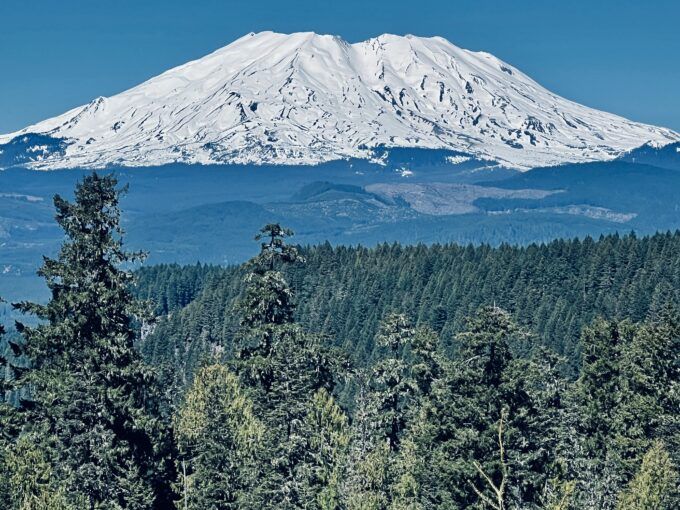
The diminishing snowpack on the southern slopes of Mount St. Helens, mid-April, 2024. Photo: Jeffrey St. Clair.
+ With another dry summer forecast for the Pacific Northwest and the snowpack in the Cascade Range at the lowest level in at least a decade, Washington officials have declared a statewide drought emergency.
+ CO 2 levels for April 26: 428.63 ppm, a record high.
May
+ A new study in Nature: “Using an empirical approach… the persistence of impacts on economic growth, we find that the world economy is committed to an income reduction of 19% within the next 26 years independent of future emission choices.”
+ Temperatures every month between July and December of 2023 beat the prior record by at least 0.3C. And September shattered the previous record by 0.5C.
+ A UN labor agency report warns of the rising threat of excess heat, and climate change on the world’s workers. The International Labor Organization (ILO) estimates that over 2.4 billion workers — more than 70% of the global workforce — are likely to face excessive heat as part of their jobs at some point, according to the most recent figures available, from 2020. That’s up from over 65% in 2000.
+ The two families (Ferrero and Mars) who own the biggest chocolate corporations have more wealth than the combined GDP of the two countries (Ghana and Ivory Coast), which supply the most cocoa beans.
+ In the last ten, severe storm outages increased by 74% compared with the prior decade. High winds, rains, winter storms, tornadoes and hurricanes, accounted for 80% of all power interruptions over the last 20 years.
+ This has the flavor of a BP ad after Deepwater Horizon…The US is producing more oil (13 million barrels on average every day in 2023) and exporting more LNG than at any time in history.

+ Last year was by far the most destructive wildfire season on record in Canada. But the total burn area so far in 2024 is 20 times what it was by this time lie 2023.
+ Florida’s coral reefs have experienced a 90 percent decline in the past 40 years, largely due to warming oceans.
+ The recent storms that flooded Dubai were made 40% more intense by climate change.
+ Taxing big fossil fuel firms could raise $900 billion for climate finance by 2030.
+ According to Consumer Reports, climate change will cost a typical child born in 2024 at least around $500,000 over their lifetime—and possibly as much as $1 million—through a combination of cost-of-living increases and reduced earnings.
+ Since 1976, more than 4 billion solar panels have been manufactured worldwide and the cost per panel has declined by 96 percent.
+ US emissions declined by 3% last year, almost all of it in the power generation sector, as emissions continued to climb in the transportation, industrial and agricultural sectors.
+ Mashable: “The last time CO2 levels were as high as today, ocean waters drowned the lands where metropolises like Houston, Miami, and New York City now exist.”
June
+ You can believe whatever you want to but …. the two-year increase in the Keeling Curve of peak carbon dioxide levels is the largest on record.
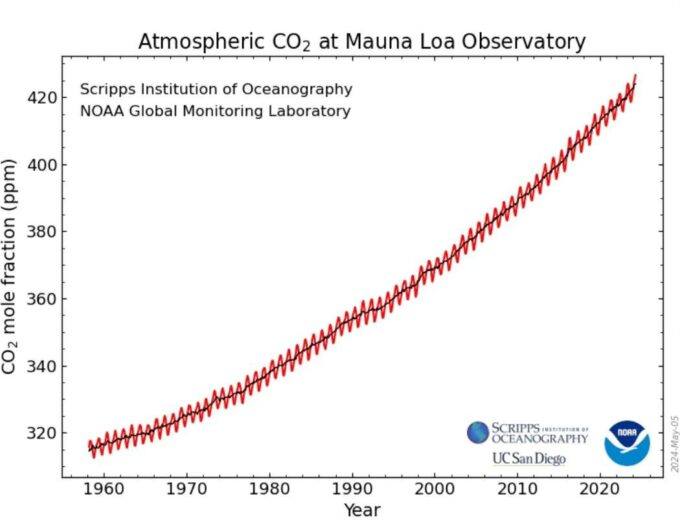
+ Why are CO2 levels continuing to soar? Because industrial nations are still burning massive amounts of fossil fuels. In fact, last year the global consumption of fossil fuels hit a record high last year, producing emissions to more than 40 gigatonnes of CO2 for the first time, according to a report by the the Energy Institute.
+ More than 1000 people have died of heat-related causes during the Hajj pilgrimage in Saudi Arabia, where temperatures in Mecca hit 51.8°C (125°F).
+ Here in the US, an Associated Press investigation calculated that there were 2,300 heat deaths last summer, a new record, and the report admitted that the number was almost certainly a dramatic undercount of the actual number of heat-related deaths.
+ A study of the 1995 Chicago heatwave showed that 28% of those admitted to hospital for heatstroke died within a year. Most of the rest had ongoing organ dysfunction and brain damage.
+ India last week, Florida in July: “At the SMS hospital in Rajasthan’s capital, Jaipur, so many bodies of casualties of the heat have arrived at the mortuary that its capacity has been exceeded. Police in the city say many of the victims are poor laborers, who have no choice but to work outside, and homeless people.”
+ A new study finds tiny particles emitted by wildfire smoke may have contributed to at least 52,000 premature deaths in California over a decade. By 2050, cumulative excess deaths from exposure to wildfire smoke globally could exceed 700,000, a two-thirds increase over current numbers.
+ From a study on the environmental impacts of wildfire smoke on lake ecosystems published in Global Change Biology: “From 2019 to 2021, we found that 99.3% of North America was covered by smoke. An incredible 98.9% of lakes experienced at least 10 smoke-days a year, with 89.6% of lakes receiving 30 smoke-days, and some lakes experiencing up to four months of smoke.” We’re fucked, might be the phrase you’re looking for…
+ A new study published by the National Bureau of Economic Research (NBER) shows that average homeowners insurance premiums have increased by 33%from 2020 to 2023, largely driven by climate-related disaster risks.
+ The record rainfall in south Florida last week, which dumped as much as 15 inches of rain in 24 hours on parts of Sarasota, Naples and Miami, normally occurs only once every 500 to 1,000 years.
+ Mario Ariza: “Eventually, Florida’s policies of agnostic adaptation will have to deal with this looming reality, where adaptation is clearly impossible, and retreat may be the only option left.”
+ According to Swiss Re, one of Europe’s largest reinsurers, insurers have dramatically underestimated the annual damages from climate-related disasters and warned that some areas of the continent may become “uninsurable.” Lloyd’s of London’s John Neal: “You’ll never find an insurer saying, ‘I don’t believe in climate change.’”
+ India’s monsoon season delivered 20% less rainfall than usual, especially concerning given the extended heat wave that has gripped the sub-continent.
+ The use of swimming pools and video games in California consume more energy than some entire countries.
+ China’s solar module production, which has tripled since 2021, hit 1,000 GWlast year, nearly five times the rest of the world combined.
+ Worldwide the average price for photovoltaic panels is 11 cents per watt, a global price largely based on the market of the leading producer, China. The average price for panels in the United States was 31 cents per watt.
+ Nearly one-third of all oceangoing ships are carrying fossil fuels.
+ Average CO2 levels for June: 426.91 ppm, a record high
July
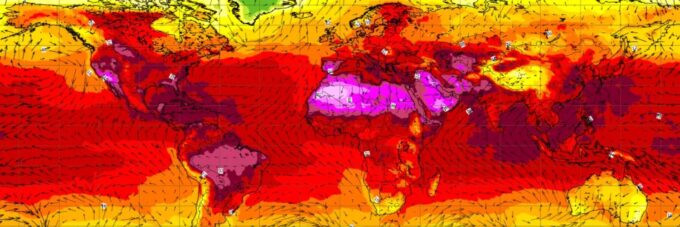
+ Last Sunday was the hottest day ever recorded on Earth. Monday was even hotter.
+ Bidenmentalism in Action: “No country in history has extracted as much oil as the US has in each of the past six years.” Will Harris stop the drilling?
+ Oil production in the US has more than doubled in less than a decade.
+ Since the world started to get “serious” about global warming, coal demand has only increased–rising by 75% since the Kyoto Protocol in 1997 and by nearly 15% since the Paris Agreement in 2015.
+ Every six hours the world burns enough coal to build a new replica of the Great Pyramid of Giza.
+ On July 15, Chicago issued 16 tornado warnings, the most sent on a single day since 2004. In an average year, Illinois only experiences 50 tornadoes. This year it’s been hit more than 100, already.
+ The Park Fire outside Chico grew by 100,000 acres in a mere 24 hours. It ignited when someone lit a car on fire and rolled it into a forested ravine, but it blew up because the forest is parched bone-dry by year after year of searing summer heat.

+ Here in Oregon’s Willamette Valley we tied a record for the most consecutive 100F-degree days, which, sandwiched between an even longer string of 90+ days, prompted a “flash drought,” pushing the wildfire danger from “low” to “high” in the span of a few days. Oregon has effectively dried out. There are currently at least 27 wildfires burning in Oregon across more than 256,500 acres of land.
August
+ In her acceptance speech, Harris mentioned the border seven times, while saying “climate change” and “health care” only once each.
+ Harris in 2019: “We should do something about the actual emergencies that plague our nation — like climate change or health care access — not playing politics in order to build a wasteful border wall.” Harris is turning flip-flopping into an Olympic sport, just in time for LA to host the next summer games.
On Tuesday, southern Iran recorded a heat index of 82.2°C and a dew point of 36.1°C, provisionally the highest ever globally. The extreme “feels like” temperature is not compatible with life…
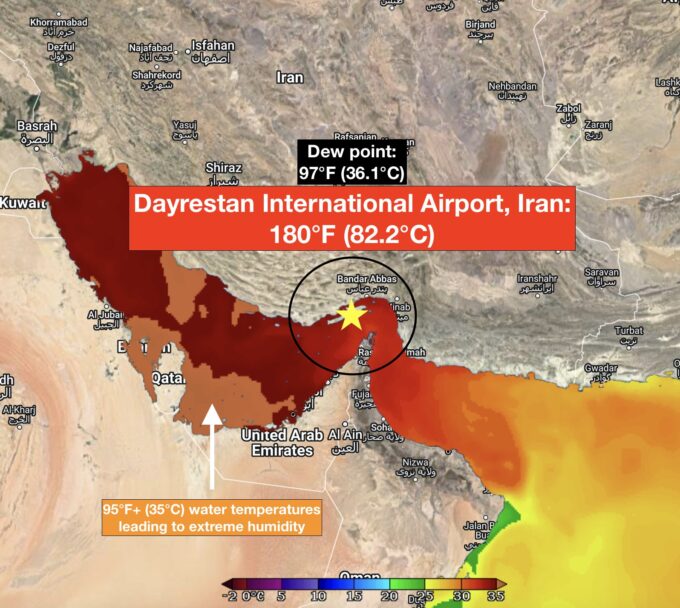
+ A new study published in the Journal of the American Medical Association reports that heat-related deaths in the US have increased by 117% since 1999. “As temperatures continue to rise because of climate change, the recent increasing trend is likely to continue,” the researchers wrote. “Local authorities in high-risk areas should consider investing in the expansion of access to hydration centers and public cooling centers or other buildings with air conditioning.” From 1999 to 2023, there have been at least 21,500 heat-related deaths in the US. Using data from the Centers for Disease Control and Prevention, the researchers found that 1,069 deaths were heat-related in 1999, compared with 2,325 in 2023, the most ever recorded.
+ Trump has spent the last few months mocking the idea of rising sea levels, claiming oceans will only rise “one-eighth of an inch over the next 400 years … and you’ll have more oceanfront property, right?” Wrong. A new UN reportwarns that rising seas are already causing more frequent coastal flooding and that for some Pacific nations coastal flooding will go from the average of fewer than five days a year between 1980 through the 2010s to once every two weeks by 2050 and once every 2 to 3 days in a worst case scenario.
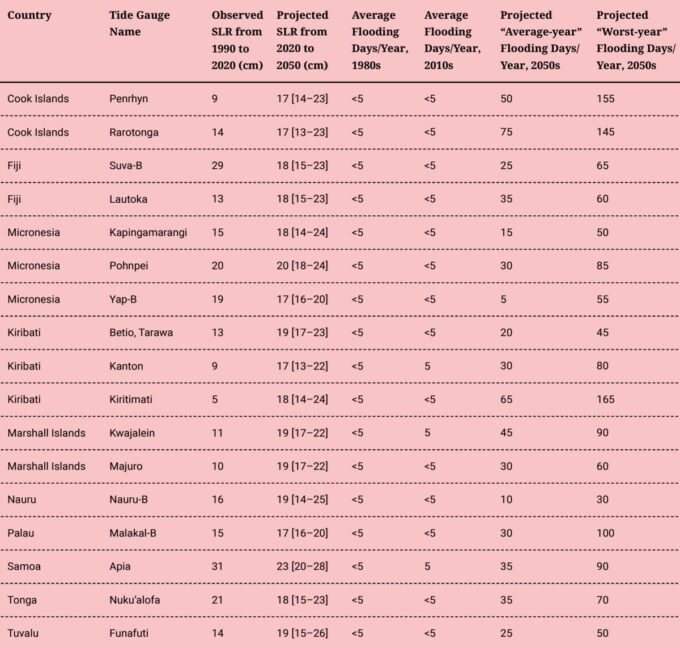
+ For some Pacific nations, floods will go from fewer than 5 days a year in 1980-2010s, to once a fortnight on average by 2050, and every 2-3 days in a worst-case scenario.
+ Warming ocean currents are undermining the massive Thwaites glacier in Antarctica. The collapse of the so-called Doomsday Glacier could raise sea levels by as much as 7 feet.
+ In only five days last week, Canada’s total wildfire area for the year has grown by more than 700,000 hectares. 2024 is now the *fourth* worst fire season in Canadian history record. If another 406,000 hectares burn it will move into third place, making 2024 the fourth worst fire season on record with another two months left in the fire season. If another 406,000 hectares burn it will move into third place.
+ According to NOAA’s newly released State of the Climate report for 2023,
* the concentration of greenhouse gasses was the highest on record
* El Niño conditions contributed to record-high sea surface temperatures
* Ocean heat and global sea levels were the highest on record
* The Arctic was warm and navigable
* Antarctic sea ice was at record lows throughout the year.
* Heatwaves and droughts contributed to massive wildfires around the world
+ If you want proof, all you have to do is look at the daily atmospheric CO2 readings from Mauna Loa since Kyoto and Paris…
+ The more than 500,000 trees logged off to make way for Musk’s new Tesla factory in Germany increased carbon emissions by 13,000 tons, the equivalent of driving 33 million miles in a combustion car.
+ On Monday, Yampi Sound experienced its hottest winter day ever recorded in Australia, hitting 106.8°F (41.6°C).
+ A new report from CoreLogic found that 2.6 million homes across 14 western states are at risk from wildfires, led by California with more than 1,258,748 homes in danger, followed by Colorado with 321,294) and Texas with 244,617.
+ Exxon is warning of an “oil shock” if suppliers conclude that oil demand will fall by 2050.
September
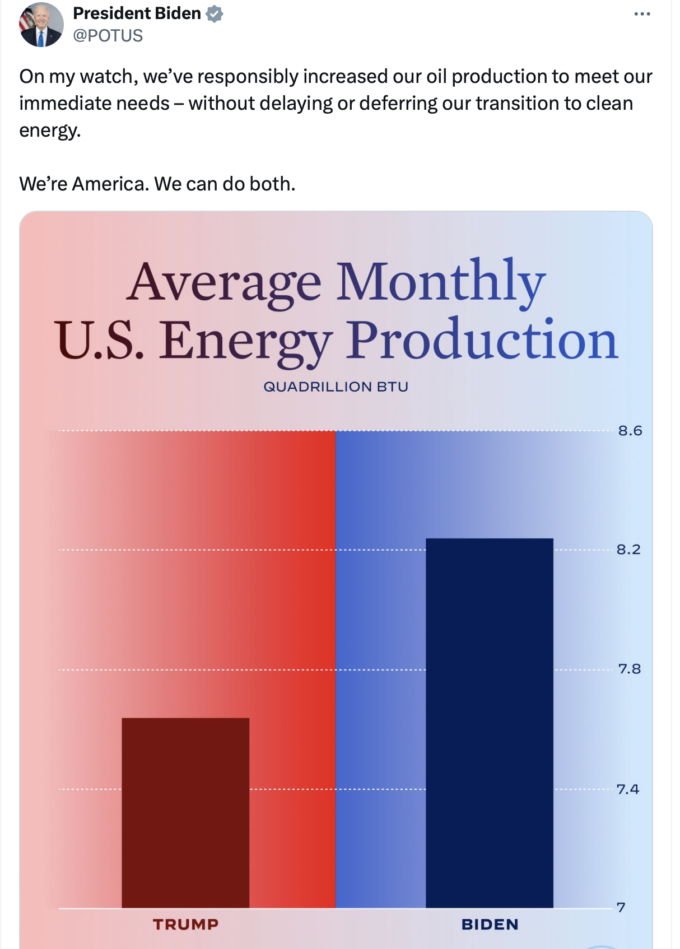 + Bidenmentalism in a nutshell: “On my watch, we’ve responsibly increased our oil production to meet our immediate needs – without delaying or deferring our transition to clean energy. We’re America. We can do both.” Sorry, Joe, you haven’t and you can’t…
+ Bidenmentalism in a nutshell: “On my watch, we’ve responsibly increased our oil production to meet our immediate needs – without delaying or deferring our transition to clean energy. We’re America. We can do both.” Sorry, Joe, you haven’t and you can’t…
+ The Global temperature in August 2024 tied with August 2023 for the warmest of any August on record. Up in Svalbard at 78° north latitude in the Arctic Ocean, the average temperature for August was a hitherto unfathomable 51.8 F (11 C)…
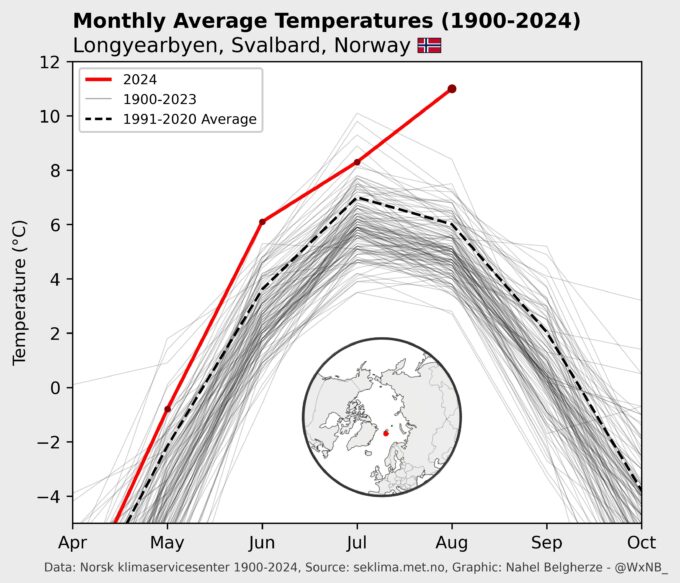 + For three months, the temperature in Phoenix averaged 99F…On Wednesday, the temperature in Phoenix reached 100 degrees Fahrenheit for a record 100th straight day.
+ For three months, the temperature in Phoenix averaged 99F…On Wednesday, the temperature in Phoenix reached 100 degrees Fahrenheit for a record 100th straight day.
+ US gasoline demand, the world’s single largest pool of oil consumption, has almost certainly peaked for good, according to a report in Bloomberg.
+ Meanwhile, solar prices are falling. Solar module price falls to a record low of $0.096/W, according to Bloomberg’s Global Solar Market Report. The record low prices drove global installations to a new high in 2024. The report says 592 GW will be installed in 2024, an increase of 33% from last year’s record high.
+ A study out of UC Davis shows that ride-sharing apps like Uber and Lyft are luring people from using more sustainable modes of travel, like walking, cycling and public transport: “More than 50% of ride-hailing trips taken by surveyed riders in California replaced more sustainable forms of transportation — such as walking, cycling, carpooling, and public transit — or created new vehicle miles.”
+ Since 2004, Saudi Arabia’s oil production has fallen and America’s has more than doubled.
+ The Energy Information Agency estimates that North America’s liquefied natural gas (LNG) export capacity will more than double between 2024 and 2028, from 11.4 billion cubic feet per day in 2023 to 24.4 Bcf/d in 2028, if projects currently under construction begin operations as planned.
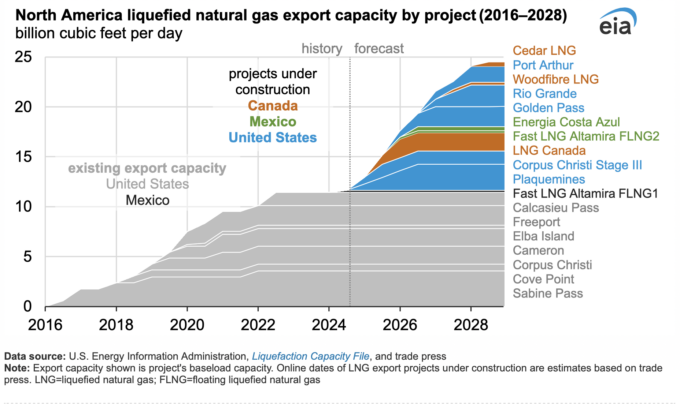 + In the first half of 2024, 80% of new electricity capacity in the US came from solar and batteries.
+ In the first half of 2024, 80% of new electricity capacity in the US came from solar and batteries.
+ Only 15 countries account for more the 98.5% of the world’s new coal power generation. But two of those 15 countries, China and India, are responsible for 86% of that capacity.
+ A decade ago, nearly 40% of UK electricity came from coal. Today the UK’s last remaining coal-fired power station is Ratcliffe-on-Soar Power Station in Nottinghamshire, England, which is itself slated to close at the end of September.
+ The hotter the temperature, the less well students do on exams. Over 13 years in NYC alone, “upwards of 510,000 exams that otherwise would have passed likely received failing grades due to hot exam conditions.” The study published in the estimates that these failed exams delayed or stopped around 90,000 graduations.
 + The ocean heat content of the Gulf of Mexico has smashed previous all-time record highs and this week stands at 126% of the average for the date.
+ The ocean heat content of the Gulf of Mexico has smashed previous all-time record highs and this week stands at 126% of the average for the date.
+ A study from the World Bank predicts that climate change will exacerbate tensions around access to water. The report says that the global supply of fresh water per person will fall by 29% between 2000 and 2099. But all regions will not be equally affected. For example, Africa’s water supply could drop by 67%, while Europe’s could increase by 28%.
+ South Korea’s top court ruled last week that the country’s measures to fight climate change were insufficient to protect the rights of its citizens. This is the first climate litigation ruling of its kind in Asia.
+ Norm Schilling, a horticulturist in Las Vegas, on the damage to desert plants from this summer’s extreme heat: “We saw damage to plants this summer that had never shown heat stress before…The heat we’re seeing now is a new paradigm. It’s like the ground is shifting beneath our feet.’”
+ More than 20% of the Amazonian rainforest is already gone and much of what remains–dried out by a mega-drought and seared by extreme heat–is going up in flames…
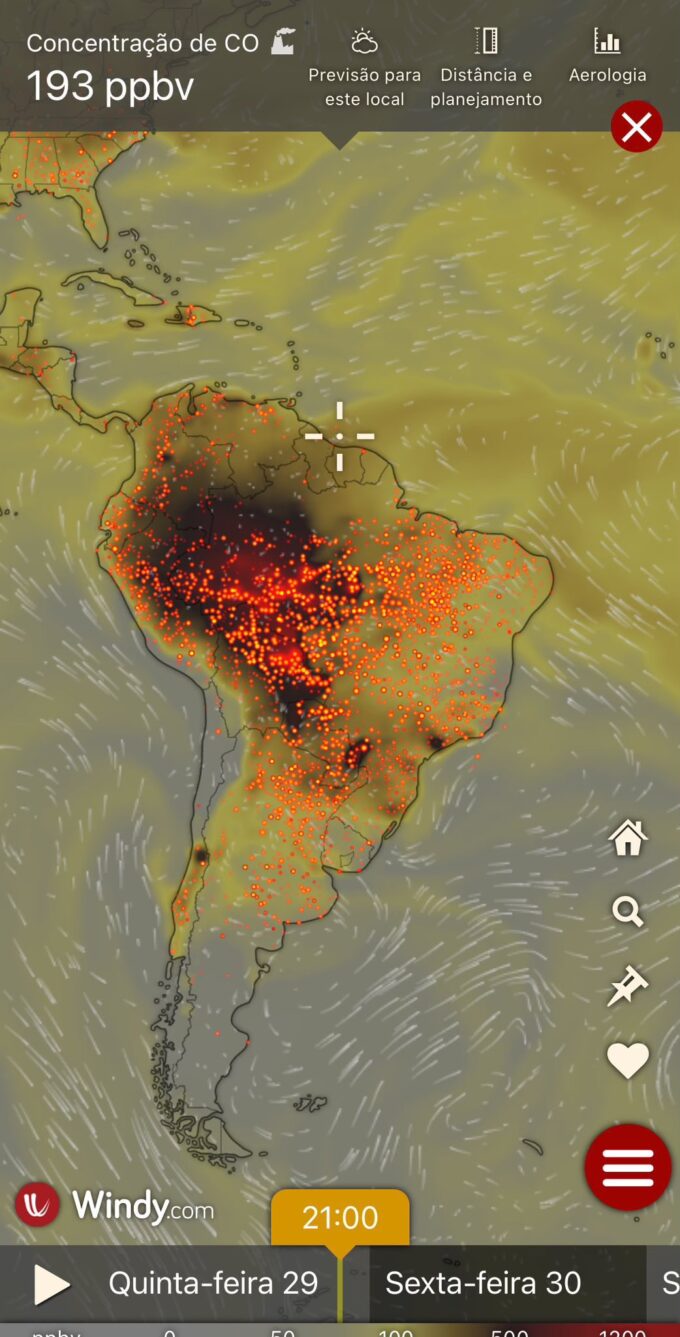 + It was 100F here in Greater Stumptown yesterday and heading toward 95F today with thick bands of smoke. And where’s there’s smoke…
+ It was 100F here in Greater Stumptown yesterday and heading toward 95F today with thick bands of smoke. And where’s there’s smoke…
 +++
+++
+ So Harris pretty effectively rebutted GOP accusations that she’s a communist, Marxist, socialist, pacifist, progressive, environmentalist, civil libertarian, or humanist.
+ With Harris, it sounds like we will get Cheney’s foreign policy, AIPAC’s Middle East policy, Goldman Sachs’ economic policy, and Exxon’s climate policy.
+ Fires are burning down towns and resorts in California, Texas is running out of water, and a hurricane is bearing down on Louisiana once again. Yet, neither candidate advanced a position on climate change last night that went much beyond drill, drill, drill and frack, frack, frack…
+ Harris is fighting climate change by, checks notes, expanding fracking, boosting oil and gas production and building new factories!
+ Can’t we all now agree that the Democrats are objectively worse than the Republicans on climate change? The Republicans don’t believe in climate change and do nothing about it. The Democrats say they believe in climate change and still do nothing about it.
+ Move along, nothing to see here…
 + The US is adding more gas-powered plants than it has in more than a decade, mainly to keep up with the energy demands created by big tech data centers and the AI boom.
+ The US is adding more gas-powered plants than it has in more than a decade, mainly to keep up with the energy demands created by big tech data centers and the AI boom.
+ Emissions from data centers are likely 662% higher than big tech claims. Last year, data centers consumed a fifth of Ireland’s electricity, more than all the electricity used by homes in its towns and cities combined.
+ Microsoft’s AI data centers consume so much energy they’re spending $1.6 billion to reboot the Three Mile Island nuclear plant to power it.
 + What could go wrong?
+ What could go wrong?
+ Canada has made real progress in adding renewables to its electric power sector. But these gains have been wiped out by significant increases in oil and gas production, which now account for 31% of its national emissions.
+ The unnamed storm that smashed into North Carolina last week unloaded as much as 20 inches of rain in 12 hours and inflicted $7 billion in damage. There have now been more than 20 extreme-weather events in the US so far this year that have each wreaked $1 billion or more in damages.
+ Over the last 30 years, the average gas tax in France has been around eight times higher than in the United States.
+ Toxicologist George Thompson on the lingering poisonous fallout from the chemicals spilled by the Northfolk Southern train derailment in East Palestine, Ohio: “‘I’ve been a toxicologist for 55 years, and this is the worst event I’ve ever seen. And I’m talking about worldwide. None are as dangerous.’”
+ Nearly 200 environmental defenders were killed last year, most of them by the mining industry in Latin America.
+ Bidenmentalism in Action: A month before the elections, the Biden-Harris administration, which has been dismal on the environment, is moving to strip protections for gray wolves. They seem confident the enviros will vote for them no matter what they do and they’re likely correct…
+ A new report in Nature argues that most climate change models significantly underestimate the risk, severity, and duration of droughts, particularly in North America and Southern Africa. The report says that by 2100, the average most extended periods of drought could be ten days longer than previously projected.
+ Rep. Dan Crenshaw (R-TX) explained his opposition to solar energy: “At night, it just doesn’t work.” Crenshaw’s own state is second only to California in solar power generation (31,700 GWh), and solar power has repeatedly saved the ERCOT power grid from collapsing during recent power surges.
October
+ As for climate change, even amid the carnage inflicted by Hurricane Helene, Vance accepted the premise that there is a scientific consensus on human-caused climate change only “for the sake of argument, while Walz weirdly bragged about Biden-Harris turning the US into “an energy superpower.”
 + Here’s the extent of the stultifyingly simplistic back-and-forth on climate change and Hurricane Helene: Walz talks mainly about jobs and increasing oil and gas production, and Vance complains that most solar panels used in the US are made in China (they aren’t)…
+ Here’s the extent of the stultifyingly simplistic back-and-forth on climate change and Hurricane Helene: Walz talks mainly about jobs and increasing oil and gas production, and Vance complains that most solar panels used in the US are made in China (they aren’t)…
Nora O’Donnell: Let’s turn now to Hurricane Helene. The storm could become one of the deadliest on record. More than 160 people are dead and hundreds more are missing. Scientists say climate change makes these hurricanes larger, stronger and more deadly because of the historic rainfall. Senator Vance, according to CBS News polling, seven in ten Americans and more than 60% of Republicans under the age of 45 favor the U.S. taking steps to try and reduce climate change. Senator, what responsibility would the Trump administration have to try and reduce the impact of climate change? I’ll give you two minutes.
JDV: Sure. So first of all, let’s start with the hurricane because it’s an unbelievable, unspeakable human tragedy. I just saw today, actually, a photograph of two grandparents on a roof with a six-year-old child, and it was the last photograph ever taken of them because the roof collapsed, and those innocent people lost their lives. And I’m sure Governor Walz joins me in saying our hearts go out to those innocent people, our prayers go out to them. And we want as robust and aggressive as a federal response as we can get to save as many lives as possible. And then, of course, afterward, to help the people in those communities rebuild. I mean, these are communities that I love, some of them I know very personally. In Appalachia, all across the Southeast, they need their government to do their job. And I commit that when Donald Trump is president again, the government will put the citizens of this country first when they suffer from a disaster. And Norah, you asked about climate change. I think this is a very important issue. Look, a lot of people are justifiably worried about all these crazy weather patterns. I think it’s important for us, first of all, to say Donald Trump and I support clean air and clean water. We want the environment to be cleaner and safer, but one of the things that I’ve noticed some of our democratic friends talking a lot about is a concern about carbon emissions. This idea that carbon emissions drives all the climate change. Well, let’s just say that’s true, just for the sake of argument, so we’re not arguing about weird science. Let’s just say that’s true. Well, if you believe that, what would you, what would you want to do? The answer is that you’d want to reshore as much American manufacturing as possible and you’d want to produce as much energy as possible in the United States of America because we’re the cleanest economy in the entire world. What have Kamala Harris’s policies actually led to? More energy production in China, more manufacturing overseas, more doing business in some of the dirtiest parts of the entire world. When I say that, I mean the amount of carbon emissions they’re doing per unit of economic output. So if we actually care about getting cleaner air and cleaner water, the best thing to do is to double down and invest in American workers and the American people. And unfortunately, Kamala Harris has done exactly the opposite.
Nora O’Donnell: Governor Walz, you have two minutes to respond.
TW: Well, we got close to an agreement because all those things are happening. Look, first of all, it is a horrific tragedy with this hurricane, and my heart goes out to the folks that are down there in contact with the Governors. I serve as co-chair of the council of governors as we work together on these emergency managements. Governors know no partisanship. They work together to… all of the Governors and the emergency responders are on the ground. Those happen on the front end. The federal government comes in, makes sure they’re there, that we recover. But we’re still in that phase where we need to make sure that they’re staying there, staying focused.
Now, look, coming back to the climate change issue, there’s no doubt this thing roared onto the scene faster and stronger than anything we’ve seen. Senator Vance has said that there’s a climate problem in the past; Donald Trump called it a hoax and then joked that these things would make more beachfront property to be able to invest in. What we’ve seen out of the Harris administration now, the Biden Harris administration is, we’ve seen this investment, we’ve seen massive investments, the biggest in global history that we’ve seen in the Inflation Reduction Act, has created jobs all across the country. Two thousand in Jeffersonville, Ohio. Taking the EV technology that we invented and making it here. Two hundred thousand jobs across the country. The largest solar manufacturing plant in North America sits in Minnesota. But my farmers know climate change is real. They’ve seen 500-year droughts, 500-year floods, back to back. But what they’re doing is adapting, and this has allowed them to tell me, “Look, I harvest corn, I harvest soybean, and I harvest wind.” We are producing more natural gas and more oil at any time than we ever have. We’re also producing more clean energy. So the solution for us is to continue to move forward, that climate change is real. Reducing our impact is absolutely critical. But this is not a false choice. You can do that at the same time you’re creating the jobs that we’re seeing all across the country. That’s exactly what this administration has done. We are seeing us becoming an energy superpower for the future, not just the current. And that’s what absolutely makes sense. And then we start thinking about, “How do we mitigate these disasters?”
Nora O’Donnell: Thank you, Senator. I want to give you an opportunity to respond there. The Governor mentioned that President Trump has called climate change a hoax. Do you agree?
JDV: Well, look, what the President has said is that if the Democrats, in particular, Kamala Harris and her leadership, if they really believe that climate change is serious, what they would be doing is more manufacturing and more energy production in the United States of America, and that’s not what they’re doing. So clearly, Kamala Harris herself doesn’t believe her own rhetoric on this. If she did, she would actually agree with Donald Trump’s energy policies. Now, something Governor Walz said, I think is important to touch upon, because when we talk about “clean energy,” I think that’s a slogan that often the Democrats will use here. I’m talking, of course, about the Democratic leadership. And the real issue is that if you’re spending hundreds of millions or even billions of dollars of American taxpayer money on solar panels that are made in China, number one, you’re going to make the economy dirtier. We should be making more of those solar panels here in the United States of America.
TW: We are in Minnesota.
JDV: Some of them are, Tim, but a lot of them are being made overseas in China, especially the components that go into those solar panels. So, if you really want to make the environment cleaner, you’ve got to invest in more energy production. We haven’t built a nuclear facility, I think one, in the past 40 years. Natural gas. We have got to invest more in it. Kamala Harris has done the opposite. That’s raised energy prices and also meant that we’re doing worse by the climate.
Nora O’Donnell: Senator, your time is up. Governor, would you like to respond?
TW: Well, look, we’re producing more natural gas than we ever have. There’s no moratorium on that. We’re producing more oil. But the folks know, and my… like I said, again, these are not liberal folks. These are not folks that are green, new deal folks. These are farmers that have been in drought one year and massive flooding the next year. They understand that it makes sense. Look, our number one export cannot be topsoil from erosion from these massive storms. We saw it in Minnesota this summer. And thinking about, “How do we respond to that?” we’re thinking ahead on this and what Kamala Harris has been able to do in Minnesota, we’re starting to weatherproof some of these things. The infrastructure law that was passed allows us to think about mitigation in the future. How do we make sure that we’re protecting by burying our power lines? How do we make sure that we’re protecting lakefronts and things that we’re seeing more and more of? But to call it a hoax and to take the oil company executives to Mar-a-Lago, say, give me money for my campaign and I’ll let you do whatever you want. We can be smarter about that. And an all of the above energy policy is exactly what she’s doing, creating those jobs right here.
+ Trump on climate change: “The planet has actually gotten a little bit cooler recently. Climate change covers everything. It can rain, it can be dry, it can be hot, it can be cold. Climate change. I believe I really am an environmentalist. I’ve gotten environmental awards.”
+ Meanwhile, the Desert Southwest experienced the most extreme high temperatures ever recorded in October.
 + Trump on the Green New Deal, getting more and more insane: “They wanted to rip down all the buildings in Manhattan and they wanted to rebuild them without windows. Take a look; you have to see the bathrooms. Basically, water-free bathrooms, no water. It’s so gross.”
+ Trump on the Green New Deal, getting more and more insane: “They wanted to rip down all the buildings in Manhattan and they wanted to rebuild them without windows. Take a look; you have to see the bathrooms. Basically, water-free bathrooms, no water. It’s so gross.”
+ What kind of anti-social personality type is still watching this debate, I ask myself, while watching the debate…
+++
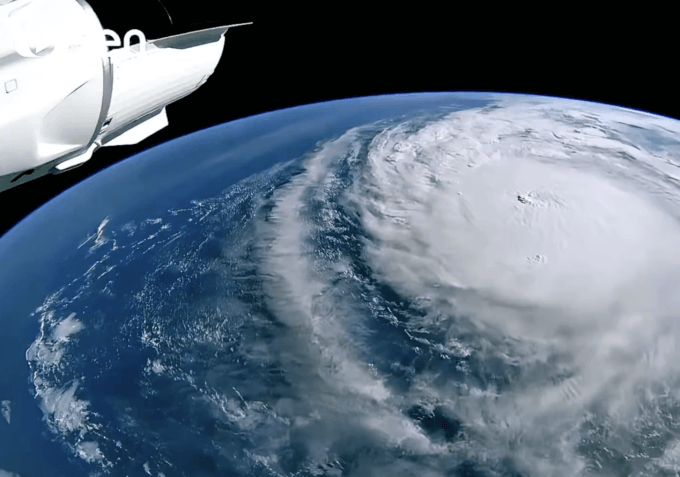
Milton from the International Space Station. Photo: NASA.
+ Two weeks after Hurricane Helene tore through the Florida panhandle and left a trail of destruction into the Appalachians and beyond, the Atlantic brewed up three more hurricanes, Kirk, Leslie and Milton: the first time three such storms have been swirling simultaneously after September.
+ Helene killed at least 238 people (with hundreds more still missing) in six states (Florida, Georgia, Tennessee, South Carolina, North Carolina and Virginia), making it the second-deadliest hurricane to strike the United States mainland in the past 50 years, after Hurricane Katrina, which killed at least 1,833 people in 2005.
+ More than half of Helene’s deaths took place in North Carolina.
+ Only eight hurricanes have killed more than 100 people since 1950. The last time a storm near as deadly as Helene hit the US was Hurricane Harvey in 2017, which killed 103 people after making landfall near Houston.
+ The initial estimates put Helene’s economic impact at $200 billion, making it the costliest storm in U.S. history.
+ Fueled by record-high temperatures in the Gulf of Mexico, Helene went from a tropical storm into a category 4 hurricane in only two days.
+ Weather Channel depiction of what a 9-foot storm surge in a coastal Florida town would look like.
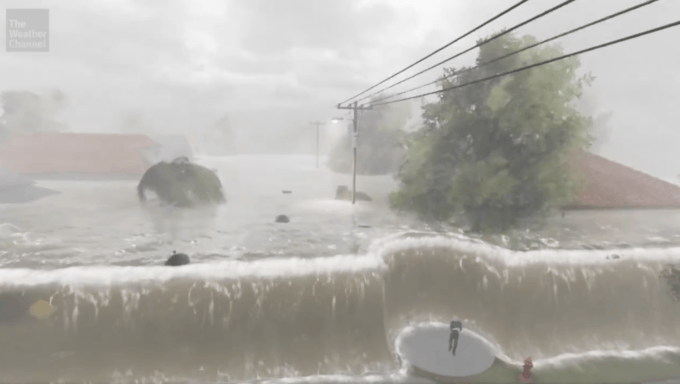 + 15 feet: Helene’s storm surge when it swamped the coastal towns of Keaton Beach and Steinhatchee.
+ 15 feet: Helene’s storm surge when it swamped the coastal towns of Keaton Beach and Steinhatchee.
+ 12 feet: Milton’s storm surge at Sarasota.
+ Total rainfall east of the Mississippi during Hurricane Helene: over 40 Trillion gallons. More than 20 Trillion gallons fell across Georgia, Florida, Tennessee, and North and South Carolina, especially over mountainous terrain.
+ Over three days, Helene unleashed more than 30 inches of rain over parts of North Carolina.
+ Human-caused climate change boosted Hurricane Helene’s rainfall by about 10% and intensified its winds by about 11%, scientists said in a new flash study released just as Hurricane Milton threatened the Florida coast less than two weeks later.
+ The Gulf of Mexico has warmed at a rate of 0.34 °F (0.19 °C) per decade since 1970, more than twice the rate of the oceans at large.
+ Upper ocean heat content in the Atlantic during the last 66 years…
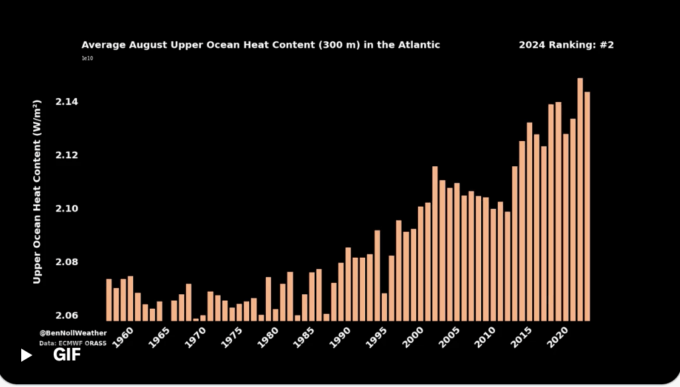 + The destruction inflicted by Hurricane Helene forced the Federal Government’s largest repository of climate and weather data, including all historical billion-dollar storms, offline.
+ The destruction inflicted by Hurricane Helene forced the Federal Government’s largest repository of climate and weather data, including all historical billion-dollar storms, offline.
+ Chevron is sponsoring articles about Hurricane Helene as part of a PR blitz to convince people that its new ultra-high-pressure offshore deep-drilling project, Anchor, is climate-friendly.
+ Trump Hurricane Helene: “She [Harris] didn’t send anything or anyone at all, days passed, no help as men, women, and children drowned. North Carolina has eight military bases. Fort Bragg. They changed the name. We won two wars from Fort Bragg.”
+ More than 5,000 National Guard troops from at least nine states were dispatched to help with Hurricane Helene relief efforts, including soldiers from Connecticut, Maryland, Pennsylvania, Iowa, Ohio, New York, South Carolina, Florida, and North Carolina. Meanwhile, the U.S. Army Corps of Engineers has sent personnel to Georgia, as well as dam, levee, and bridge inspection specialists to Tennessee and Kentucky, while others are working to restore temporary power to North Carolina.
+ After the wreckage left by Helene, Florida’s largest property insurer announced it was cutting policies for more than 600,000 homeowners in the state.
+ Milton is the only Category 5 hurricane in Atlantic records (HURDATv2, 1851-present) to exhibit any southeasterly motion vector.
+ According to US Stormwatch, the blue in this image is of birds caught in the Eye of Milton.
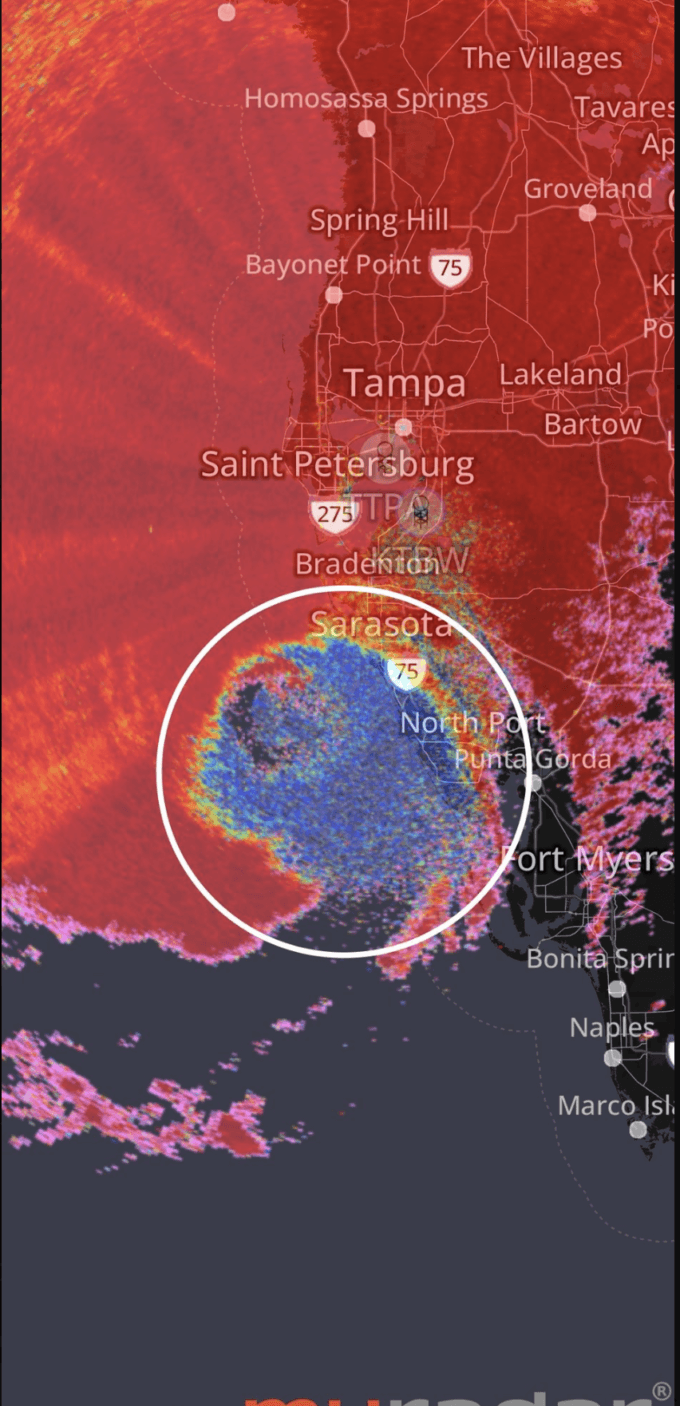 + Most intense Atlantic hurricanes in history by minimum barometric pressure:
+ Most intense Atlantic hurricanes in history by minimum barometric pressure:
1. Wilma (2005) – 882 mb
2. Gilbert (1988) – 888 mb
3. “Labor Day” Hurricane (1935) – 892 mb
4. Rita (2005) – 895 mb
5. Allen (1980) – 899 mb
6. Camille (1969) – 900 mb
7. Katrina (2005) – 902 mb
8. Milton (2024); Dean (2007); Mitch (1998) – 905 mb
+ St. Petersburg reported nearly seven inches of rain in an hour and 10 inches over 3 hours, more of a drenching than a thousand-year rain event. Thresholds for 1,000-year rain in South Florida:
5.56”/1 hour
7.16”/2 hours
8.50”/3 hours
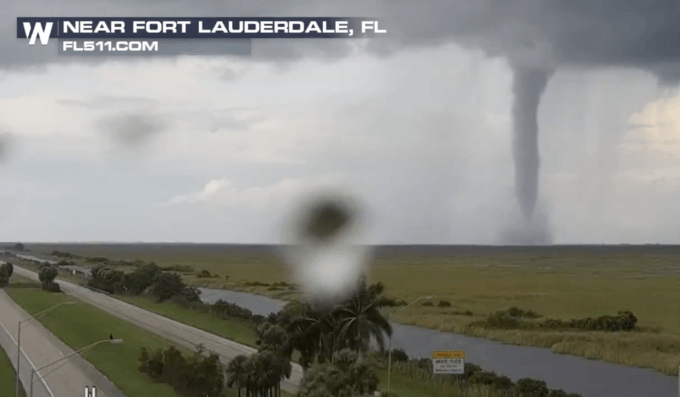 + Milton generated more than 130 tornado warnings in South Florida as the storm neared the coast, a new record for Florida…
+ Milton generated more than 130 tornado warnings in South Florida as the storm neared the coast, a new record for Florida…
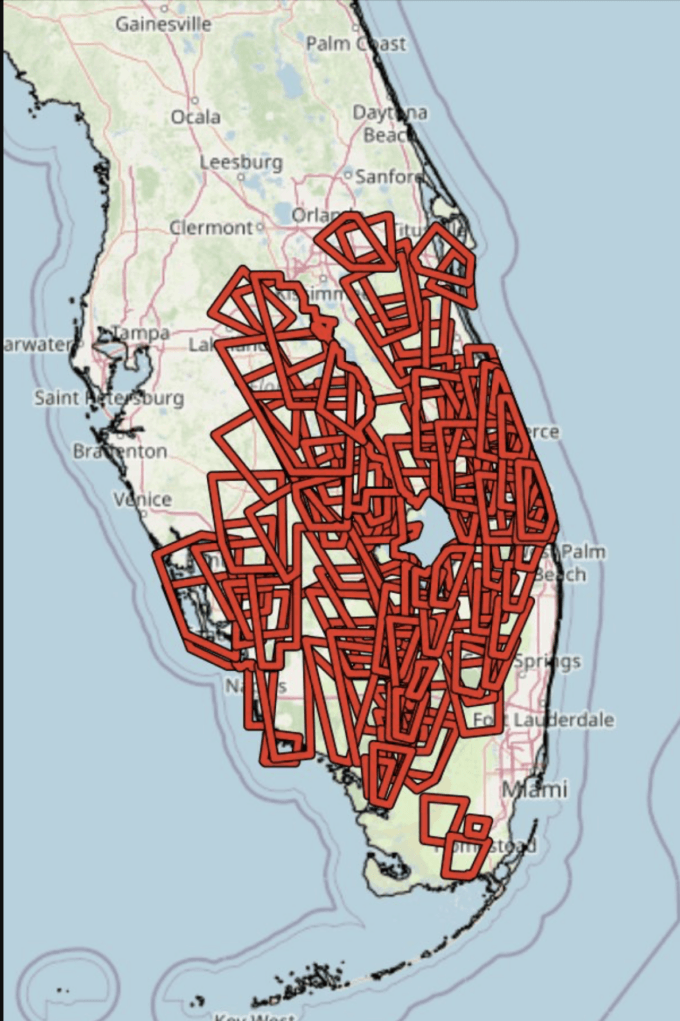 + Only seven hurricanes have gone from Category 1 to Category 5 in 24 hours or less. Milton is now the second fastest to do so…
+ Only seven hurricanes have gone from Category 1 to Category 5 in 24 hours or less. Milton is now the second fastest to do so…
Wilma: 12 hoursMilton: 18 hoursMaria: 18 hoursFelix: 24 hoursDean: 24 hoursAndrew: 24 hoursAnita: 24 hours
+ The “free” Starlink service Elon Musk offered for communities devastated by Hurricane Helene is not free. It’s just the ordinary 30-day trial, and you must buy the hardware.
+ Trump: “I don’t like the reports that I’m getting about the Federal Government and the Democrat Governor of the State going out of their way to not help people in Republican areas.”
+ Recall that Trump blocked $20 billion in aid for Puerto Rico after Hurricane Maria killed over 3,000 people and knocked out electricity on the island for 11 months.
+ There are already hundreds of allegations of price-gouging after Hurricane Helene and Milton. Harris was against price-gouging for about two days, then backed down after getting slapped by blowhards like Larry Summers–the Dick Cheney of economics. Nothing since, even though the evidence is everywhere. McDonalds is now suing the meatpacking industry for price-fixing…
+ The State of Florida refused to evacuate more than 1,200 people from the Manatee and Lee county jails, which were directly in the path of Hurricane Milton. (During Katrina, the people who ran the jails of New Orleans decided that 6,500 incarcerated people, some as young as ten years old, would remain “where they belong.”)
+ This was the second warmest September on record (2023). Nearly 15% of the globe had their single warmest September.
 + Foreign aid for fossil fuel projects quadrupled in a single year, found, spiking from $1.2 billion in 2021 to $5.4billin in 2022. Meanwhile, clean energy projects received only one percent of total foreign aid, according to a report from the Clean Air Fund.
+ Foreign aid for fossil fuel projects quadrupled in a single year, found, spiking from $1.2 billion in 2021 to $5.4billin in 2022. Meanwhile, clean energy projects received only one percent of total foreign aid, according to a report from the Clean Air Fund.
+ Helene and Milton have given rise to a new grift: Hurricane Conspiracies….
+ “Yes, they can control the weather,” Marjorie Greene Tweeted on X. “It’s ridiculous for anyone to lie and say it can’t be done…Climate change is the new Covid. Ask your government if the weather is manipulated or controlled. Did you ever give permission to them to do it? Are you paying for it? Of course you are.”
+ Trump: “Kamala spent all her FEMA money, billions of dollars, on housing for illegal migrants, many of whom should not be in our country…They stole the FEMA money, just like they stole it from a bank, so they could give it to their illegal immigrants that they want to have vote for them this season.”
+ Of the many false claims about Hurricane Helene, one asserted that North Carolina state police had begun arresting FEMA workers. It was planted on social media by a “mid-level” organizer from the Bundy Ranch standoff.
+ According to Wired, “the weather conspiracies, in particular, ramped up significantly after 2011 when a member of the Rothschild family acquired a controlling stake in Weather Central, a company that provides weather data to media companies.”
+ Give MAGA credit. Their conspiracy theories about the Rothschilds (one of them apparently invested in Weather Central) summoning up pre-election hurricanes out of the Gulf and aiming at red states is at least an admission of human-caused climate change. You’ve come a long way, baby.
+ If you want to make it big on the Net, you must have a theory of why what happened didn’t happen.
+ The Helene Conspiracies spread so broadly across his district that Republican Congressman Chuck Edwards felt obliged to issue this extraordinary press release, which is worth reprinting in its entirety as evidence of just how “weird” things have become…
Debunking Helene Response Myths
October 8, 2024
Dear Friend,
Over the past 10 days, I have been proud of how our mountain communities have come together to help one another. We have seen a level of support that is unmatched by most any other disaster nationwide; but amidst all of the support, we have also seen an uptick in untrustworthy sources trying to spark chaos by sharing hoaxes, conspiracy theories, and hearsay about hurricane response efforts across our mountains.
While it is true, the Federal Emergency Management Agency’s response to Hurricane Helene has had its shortfalls, I’m here to dispel the outrageous rumors that have been circulated online:
1. Hurricane Helene was NOT geoengineered by the government to seize and access lithium deposits in Chimney Rock.
Nobody can control the weather.
Charles Konrad, director of the National Oceanic and Atmospheric Administration’s Southeast Regional Climate Center, has confirmed that no one has the technology or ability to geoengineer a hurricane.
Current geoengineering technology can serve as a large-scale intervention to mitigate the negative consequences of naturally occurring weather phenomena, but it cannot be used to create or manipulate hurricanes.
2. Local officials have confirmed the government is NOT seizing Chimney Rock.
There was no “special meeting” held in Chimney Rock between federal, state, or local governments about seizing the town.
3. Local officials are NOT abandoning search and rescue efforts to bulldoze over Chimney Rock.
4. Chimney Rock is NOT being bulldozed over.
Rutherford County emergency services personnel are going to extensive lengths to search for missing people, including in debris by using cadaver dogs to locate any remains of individuals trapped in the debris.
Just as every other community in Western North Carolina, Chimney Rock officials are focused first and foremost on recovery efforts, followed by plans to rebuild in the future.
5. FEMA is NOT stopping trucks or vehicles with donations, confiscating or seizing supplies, or otherwise turning away donations.
FEMA does not conduct vehicle stops or handle road closures with armed guards—all road closures are managed by local law enforcement, who prioritize getting resources to their fellow community members.
6. FEMA has NOT diverted disaster response funding to the border or foreign aid.
Disaster response efforts and individual assistance are funded through the Disaster Relief Fund, which is a dedicated fund for disaster efforts.
FEMA’s non-disaster related presence at the border has always been of major concern to me, even before Hurricane Helene, and I will continue to condemn their deployment of personnel to the southern border, but we must separate the two issues.
7. FEMA is NOT going to run out of money.
FEMA officials have repeatedly affirmed that the agency has enough money for immediate response and recovery needs over the next few months.
Secretary Mayorkas’ statement indicating otherwise was an irresponsible attempt to politicize a tragedy for personal gain.
In the coming months, Western North Carolina is going to need more disaster relief funding than is currently available to assist with recovery efforts.
I’m confident that supplemental disaster relief funding, which I am already involved in the process of creating, will be considered in the House once we return to session in mid-November.
8. FEMA cannot seize your property or land.
Applying for disaster assistance does not grant FEMA or the federal government authority or ownership of your property or land.
9. The FAA is NOT restricting access to airspace for Helene rescue and recovery operations.
The FAA or North Carolina Emergency Management will not prohibit anyone from flying resources into Western North Carolina as long as they coordinate their efforts with NC Aviation.
If you are looking to conduct an airdrop of resources but don’t know who to contact for approval, please reach out to my office and we will share that information with you.
10. FEMA is NOT only providing $750 to disaster survivors to support their recovery.
The initial $750 provided to disaster survivors is an immediate type of assistance called Serious Needs Assistance that may be made to individuals in need as soon as they apply for FEMA assistance.
The $750 is an upfront, flexible payment to help cover essential items like food, water, baby formula and medication while FEMA assesses the applicant’s eligibility for additional funds.
This award is just the first step of a longer process to provide financial assistance to disaster survivors in need of federal support.
As an application moves through the review process, individuals are eligible to receive additional forms of assistance for other needs such as temporary housing, personal property and home repair costs, etc.
I encourage you to remember that everything you see on Facebook, X, or any other social media platform is not always fact. Please make sure you are fact checking what you read online with a reputable source.
With my warmest regards,
Chuck Edwards
Member of Congress
+ Before Florida went MAGA, hurricanes that hit Florida were God’s punishment for the sodomy Pat Robertson believed was rampant in Miami…
+ Exxon knew better in 1990, according to its own internal memos…
 + Biden to FEMA Director Deanne Criswell: “Deanne, you’re doing a helluva job.” As our friend Jesse Walker said, “Saying this to a FEMA director is like taunting the gods.”
+ Biden to FEMA Director Deanne Criswell: “Deanne, you’re doing a helluva job.” As our friend Jesse Walker said, “Saying this to a FEMA director is like taunting the gods.”
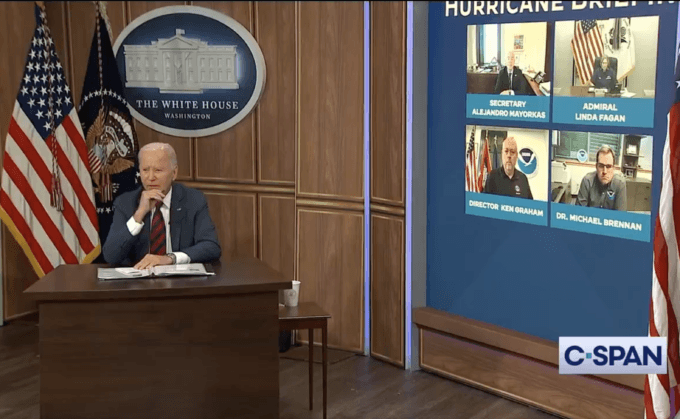 + Feeling a little schadenfreude, Michael Brown?
+ Feeling a little schadenfreude, Michael Brown?
+ Floridian Jeff VanderMeer, author of Annihilation, which was set in St Marks National Wildlife Refuge: “Very little has been learned or implemented since Hurricane Ian, which I co-wrote about for The Nation at the time. With Milton potentially hitting the same area. FL gov needs to get its act together, beyond just getting better about evacuation orders. Florida politicians have failed us while dismantling regulations and pandering to developers. This has made all of us less safe. You simply CANNOT build in parts of Florida without severe repercussions, but the legislature and developers have done so anyway…I want to emphasize this: Florida was more prepared for hurricanes fifteen years ago with much better regulation and land use ordinances than today. Developers have left us much more vulnerable by building in places they shouldn’t have, aided and abetted by Republican governors.”
 + Tim Barker: “My parents live in the Tampa Bay area. I am glad they are allowed to evacuate to safety. I am furious at my own government for denying this right to people in Gaza, which thanks to the US and Israel has become “a mass death trap” (per NYT). The moral stain will be indelible.”
+ Tim Barker: “My parents live in the Tampa Bay area. I am glad they are allowed to evacuate to safety. I am furious at my own government for denying this right to people in Gaza, which thanks to the US and Israel has become “a mass death trap” (per NYT). The moral stain will be indelible.”
+ As Hurricane Milton raged across the Gulf, Bobby Lindamood, mayor of Colleyville, Texas, suggested nuking the hurricane to “stop its rotation.”
+++
 + Oceanographer Stefan Rahmstorf on the coming collapse of the Atlantic Ocean circulation currents: “So my risk assessment has really changed. I am now very concerned that we may push Amoc over this tipping point in the next decades. If you ask me my gut feeling, I would say the risk that we cross the tipping point this century is about 50/50.”
+ Oceanographer Stefan Rahmstorf on the coming collapse of the Atlantic Ocean circulation currents: “So my risk assessment has really changed. I am now very concerned that we may push Amoc over this tipping point in the next decades. If you ask me my gut feeling, I would say the risk that we cross the tipping point this century is about 50/50.”
+ A new study in Nature reveals that climate change was a key driver behind the extreme #drought in Europe in 2022. The paper reports that human-induced global warming contributed to 31% of the intensity, with 14–41% of such contribution due to warming-driven soil drying that occurred before 2022.
+ Gavin Schmidt, NASA’s top climate scientist, said, “We are going to get to 1.5 degrees a little faster than we anticipated even four years ago. I think this year it’s about 50-50 whether we will reach 1.5 degrees in the [NASA Goddard Institute for Space Studies] temperature record.”
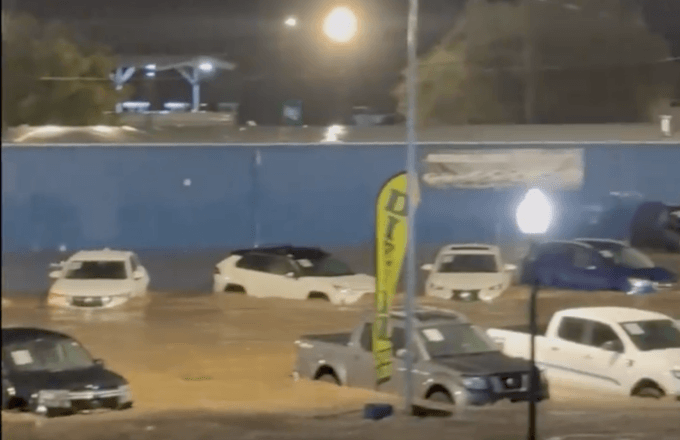
Flooding in Roswell, NM. Image: Still from a video on X.
+ On the historic rain event in Roswell, New Mexico, on Sunday: A total of 5.78″ of rain, making it Roswell’s wettest day ever. This is 1/2 their average yearly rain (11.63″). 2.70″ was recorded in one hour between 8 and 9 PM, more than the average for October, November, and December (2.34”).
+ Electric Vehicle Growth Rates for 2024
China: +32%
USA: +9%
Europe: +2% (dragged down by Germany)
Germany: -16% (following the end of an incentive program)
Japan: -12%
+ China buys more EVs than all other markets combined.
+ Development Reimagined estimates that China could install “more than 224GW of clean energy in Africa by 2030, meaning its participation in Africa’s energy transition will be crucial for the continent to meet its target of 300GW by 2030.”
+ An analysis in Nature: Communications Earth & Environment finds that global sea-level rise has doubled in the last 30 years: “Global mean sea level rise amounted to 4.5 mm per year as a result of #warming oceans and melting land ice, more than twice the rate of 2.1 mm/year observed at the start of satellite data in 1993.”
+ Since 2001, forest fires have shifted north and grown more intense. According to a new study in Science, global CO2 emissions from forest fires have increased by 60% in the last two decades.
+ The world’s natural carbon sinks are beginning to fail: “In 2023, the hottest year ever recorded, preliminary findings by an international team show the amount of carbon absorbed by land has temporarily collapsed. The final result was that forest, plants and soil–as a net category–absorbed almost no carbon.”
+ The institution of flat-rate train tickets reduced Germany’s transportation emissions by five percent in their first year of use.
+ An analysis by First Street reveals that financial losses from hurricanes are rising mainly because Americans continue to build in high-risk zones and floodplains, especially in Florida: “Nationally, 290,000 new properties were built in high-risk flood areas from 2019 through 2023, almost one in five of the 1.6 million built in total during that period.”
+ It now requires about 1/8th as much silicon to make a single solar panel as 20 years ago.
+ Over the last 50 years, global wildlife populations have fallen by nearly three-quarters. The sharpest declines have occurred in the Caribbean and Latin America, where wildlife populations have collapsed by as much as 95 percent since 1974.
+ About 77% of the world’s coral reef area has experienced “bleaching-level heat stress” between Jan. 1, 2023, and Oct. 10 of this year.
+ According to the Financial Times, “Over the past five years, renewable energy generation has grown at a compound annual rate of 23 percent in the global south, versus 11 percent in the world’s richest economies.”
+ A study in Science concludes that human-driven extinctions of hundreds of bird species over the past 130,000 years have “significantly reduced avian functional diversity and led to the loss of around 3 billion years of unique evolutionary history.”
November
 + Valencia, Spain experienced 491.2 mm of rain in 8 hours. The average annual precipitation is less than 454 mm. The floods have killed more than 158 people with nearly 2000 still missing.
+ Valencia, Spain experienced 491.2 mm of rain in 8 hours. The average annual precipitation is less than 454 mm. The floods have killed more than 158 people with nearly 2000 still missing.
2024 is on track to be the warmest year on record, with temperatures above the 1.5C warming threshold.
+ Carbon dioxide concentration has increased by more than 10% in just two decades, reports the World Meteorological Organization…
According to Oxfam, around $41 billion in World Bank climate finance —nearly 40 percent of all climate funds disbursed by the Bank over the past seven years— is unaccounted for.
+ In a span of only two decades, India lost one-fifth of its native wildlife species.
+ Amazon is funding the construction of four nuclear reactors along the Columbia River to power its AI data processing plants. They never asked us if we wanted AI, never mind the nuclear reactors needed to power it…
+++
The Earth endured its second warmest October in the last 175 years and is on its way to its warmest year on record.
 + Ilham Aliyev, president of Azerbaijan, which is hosting the latest global climate conference (CO29), called reports of his country’s soaring carbon emissions “fake news” and said that nations should not be blamed for developing and using fossil fuels like coal, oil and natural gas, which Aliyev said were “God’s gifts.” At least Aliyev showed up, unlike some of the leaders of the world’s biggest emitters, including Biden, Macron and Modi.
+ Ilham Aliyev, president of Azerbaijan, which is hosting the latest global climate conference (CO29), called reports of his country’s soaring carbon emissions “fake news” and said that nations should not be blamed for developing and using fossil fuels like coal, oil and natural gas, which Aliyev said were “God’s gifts.” At least Aliyev showed up, unlike some of the leaders of the world’s biggest emitters, including Biden, Macron and Modi.
+ Mark this ignominious distinction down on the Biden-Harris legacy: Despite the lofty pledges by Western nations at COP28 last year, global carbon emissions have hit new highs, and there is no sign of a transition away from fossil fuels.
+ According to a new study in Nature, the emissions from private flights by rich people increased by 46% between 2019 and 2023: 70% of these flights came from the US, and half were shorter than 500 kilometers–in other words, the Democrats’ new base…
+++

Biden in the Brazilian Amazon. Photo: White House.
+ When Biden showed up in Amazonia this week bragging about how he’d proved that you could maximize oil production and still protect the environment, his message was somewhat undermined by the fact that he looked like the leader of a Central American death squad, who had been trained in techniques of mass-killing at the School of the Americas…
+ Life expectancy in Delhi is almost 12 years shorter on average than it would be if the air quality met WHO standards: “In several areas of the city, pollution levels were more than 50 times higher than the World Health Organization’s recommended safe limit.”
+ Carbon Brief has put together an interactive summary of 750 extreme weather events, documenting the probable contribution of global warming. Finding: “74% were made more likely or severe because of climate change.”
+ According to the latest USDA survey, over 30% of California’s dairy herds are confirmed to be infected with H5N1 avian influenza. This situation is going to get much worse. Over to you, RFK, Jr.: An analysis of the avian flu virus taken from a hospitalized teenager in Vancouver, Canada, shows mutations that could help the virus spread more easily in humans.
+ The Biden administration has retreated from its previous position that a UN treaty should cap global plastic production. Environmental groups have characterized the reversal as “absolutely devastating.”
+ Indonesia, one of the planet’s most rapacious coal consumers, vowed this week to retire all of its currently operating coal plants within the next 15 years.
+ Poll of Canadians on climate change…
“Global warming is…”
Fact/caused by humans: 61%
Fact/caused by nature: 25%
Not real: 10%
December
+ November 2024 was the second warmest November on record in the Copernicus ERA5 dataset, at 1.62C above preindustrial levels. It was second only to November 2023, which was 1.75C above preindustrial.
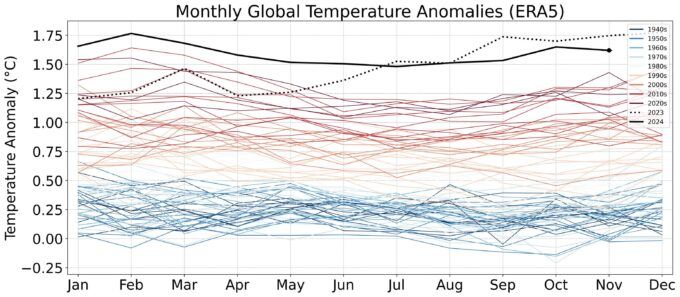 + A new study reported in Oceanographic Magazine suggests that plankton may not survive global warming. The effects on the oceans’ biotic life are described as “devasting.”
+ A new study reported in Oceanographic Magazine suggests that plankton may not survive global warming. The effects on the oceans’ biotic life are described as “devasting.”
+ Once an infrequent event, there is now an open water passage in the Arctic Ocean for nearly 40 days a year.
+ The small North Carolina town of Carrboro (pop. 21,103) has launched the nation’s first-ever climate accountability lawsuit against an electric utility. The suit alleges that Duke Energy has run a decades-long ‘deception campaign’ about fossil fuels.
+ Brazil has become the sixth nation in the World to surpass the 50 GW mark in solar energy production. Solar now provides 20% of Brazil’s electricity. This year alone, 189 solar energy plants were built.
+ Instead of setting aside more acreage for threatened wildlife in advance of the rapacious team that will soon be running the Interior Department, Biden’s Secretary of the Interior, Deb Halland, announced last week she’s cutting the critical habitat protection for the imperiled Canada Lynx by more than 88 percent in the Greater Yellowstone Ecosystem. Mike Garrity, Alliance for the Wild Rockies: “It appears that the FWS’ strategy is to cause lynx to go extinct in the lower 48 states so they no longer have to pretend to protect habitat for lynx.”
+ There are now more than 280 million electric bikes and mopeds, which are reducing carbon emissions and the demand for oil by more than all other electric vehicles combined.
+++
+ A new assessment published in Environmental Research estimates that all regions on the planet will hit the 1.5 °C warning threshold by 2040 or earlier and that 31 out of 34 regions will reach the 2.0 °C threshold by 2040. For 3.0 °C, 26 out of 34 regions are predicted to reach the threshold by 2060.
+ Once one of the planet’s top carbon sinks, the Arctic is becoming a carbon emitter as its permafrost melts.
+ According to a new study published in Science, warming ocean waters killed about half of the common murres off Alaska’s coast (more than four million birds) and have shown no signs of recovery.
+ Carbon markets don’t work to reduce carbon emissions. That’s the damning conclusion of a new report published in Nature. Even so, the World Bank, US Treasury, IMF and the UN keep pushing them as a decarbonizing solution for the Global South.
+ The first ice-free day in the Arctic Ocean may arrive before 2030.
+ According to a new report from the UN, more than three-quarters (77.6%) of Earth’s surface has become permanently drier in the last 30 years.
+ The nine largest wildfires in California’s history have occurred since 2017, including three of the five deadliest.
+ Big Tech’s AI boom is generating a natural gas infrastructure boom. Scott Strazik, the CEO of GE Vernova, maker of gas turbines, told investors: ” “They’re not building those data centers with an assumption for anything other than 24/7 power. Gas is well suited for that…I can’t think of a time that the gas business has had more fun than they’re having right now.”
+ Meanwhile, Alberta is trying to lure tech companies to build huge, power-hungry AI data centers in the province and run them on natural gas instead of solar or hydro. This will give the oil and gas industry a fresh market for its planet-killing product.
+ The persistent drought in Brazil has driven the price of Arabica coffee to a record high, topping the peak set in 1977.
+ The journal Nature reported that “On 18 November this year, Delhi’s Air Quality Index soared to 1,700 — far exceeding the safe limit of 50 set by the World Health Organization (WHO). Lahore in Pakistan had recorded a value of 1,100 a few days earlier.”
+ Global oil and gas production has increased by 14% since 2013.
+ A study from U-Mass Amherst found that the US is the top beneficiary of the recent surge in global fossil fuel prices, capturing $301 billion in profit and overtaking Saudi Arabia and Russia.
+ Tropical cyclone Cyclone Chido, a Category 4 storm which roared across the French territory of Mayotte off the coast of Mozambique on December 15, flattening entire villages, may have killed TENS of thousands of people.
+ With minimum night temperatures above 31 C (87.8 F) in the Canary Islands and 29.6 (85.3) in Puerto de La Cruz, Tenerife, December 15 was the hottest December night ever recorded in the Northern Hemisphere.
+ For Christmas week, Hudson Bay is forecast to be +20°C (68°F) warmer than the 1979-2000 average.
 + Average CO2 level for 2024: 422.5, a new record.
+ Average CO2 level for 2024: 422.5, a new record.
We remind our readers that publication of articles on our site does not mean that we agree with what is written. Our policy is to publish anything which we consider of interest, so as to assist our readers in forming their opinions. Sometimes we even publish articles with which we totally disagree, since we believe it is important for our readers to be informed on as wide a spectrum of views as possible.
